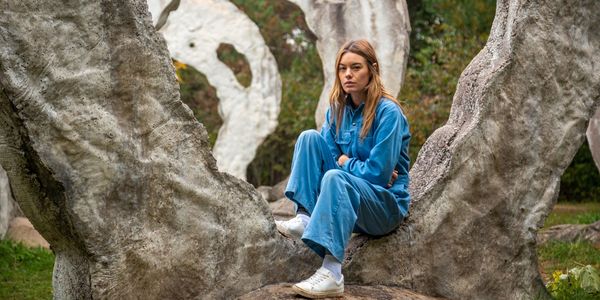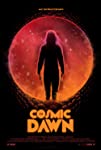Eye For Film >> Movies >> Cosmic Dawn (2022) Film Review
Cosmic Dawn
Reviewed by: Jennie Kermode

Where the majority of alien encounter-themed films are concerned, one is either with the believers or against them. In that regard, Cosmic Dawn is a breath of fresh air. It begins with an encounter scene of sorts, sure, but not much is shown to us directly there, and our protagonist is a child at the time, so it’s possible that it was all in her imagination. This leaves an air of uncertainty hanging over what follows, which enhances numerous other aspects of the film.
Some two decades later, Aurora (Camille Rowe) is a deeply damaged woman. She has spent a lifetime trying to assert her version of the facts about her mother’s disappearance, and has taken the same kind of damage as children who are disbelieved over any number of traumatic events. Rowe’s performance in these scenes is raw and powerful. In hospital again after an overdose, Aurora is in agony hearing her sister talk over her and proclaim that she’s deluded. She runs away to find sanctuary in a library, and it’s there that one of the cult members approaches her.
People like Aurora are natural targets for cults, but that’s not always a bad thing. For some, the support they get in such an environment is exactly what they need, and easily worth the sacrifice of a measure of independence which they’d likely lose to an institution or a controlling partner otherwise. Writer/director Jefferson Moneo wisely resists allows for that possibility here, independently of whether or not he expects us to buy into the cult’s beliefs, which centre on the existence of beneficent aliens and the usual promise of a near-future revelation and societal transformation. Aurora isn’t stupid and she isn’t sure if she buys into the idea that all the cult’s members have witnessed alien visitations, but it is a relief to be around people who take her story more seriously, and this is enough to persuade her to cede more and more of her life to them.
One of the other refreshing things about this film is that it allows for the existence of scepticism within the cult. That is, despite their decision to bond with one another, they’re not all fully convinced by the beliefs of their leader, the mysterious Elyse (Antonia Zegers) – nor does she expect them to be. They’re also wary of being latched onto by fantasists or outright liars. This allows for disagreements which make the dramatic scenes much more interesting. Aurora doesn’t give herself over completely to the cult’s ideas, and is particularly uncomfortable about the possibility that one of its members, Natalie (Emmanuelle Chriqui), who experiences visions, may be doing so as a result of a dangerous illness. She grows close to Natalie’s husband Tom (Joshua Burge) in one of those rare examples of intellectually-focused male/female screen friendship whose dangers lie in something other than sexuality.
Is there danger at all? Moneo prompts viewers to examine the bias towards a cynical perspective which much of modern cinema inculcates. The ending seems to choose a direction, but even then, it’s not a hundred percent clear, and the suggestion of resolution raises other big questions. There are uncertain motives here. Having based the story on an incident in his own life, Moneo brings biases of his own, and it’s not clear that he has fully examined them, but Cosmic Dawn is nonetheless a better than average film of its ilk.
Reviewed on: 08 Feb 2022















